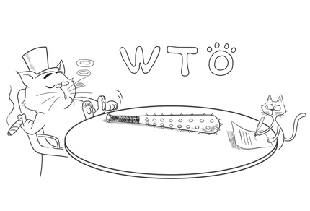
[By Zhou Tao/Shanghai Daily]
 |
|
[By Zhou Tao/Shanghai Daily] |
Chinese exporters' mood swung from low to high on July 15, when the World Trade Organization supported China's case against the European Union's anti-dumping duties on Chinese-made steel fasteners.
This unprecedented victory over the Europeans came 10 days after the WTO ruling that China's restrictions on raw materials exports were illegal. The rulings under the same WTO framework have mirrored to some extent the conflicting interests and unequal status of WTO members.
In theory, the establishment of the General Agreement on Tariffs and Trade, the WTO's precursor, is aimed at fostering global free trade, growth and citizens' well-being. Its preamble starts with the pledge that all members will be treated as equals. In fact, there is a disparity between the privileges enjoyed by old and new members.
This reality owes much to the fact that a candidate must obtain the approval of all 153 members to join the WTO, although there is an article stipulating that a two-thirds majority vote is enough for the admission of new members. This arrangement enables existing members to dictate terms on the accession of new members, which previously centered on trade but now increasingly extends to their domestic economic systems. They seek to curb the rights of new members, leading to de facto inequality in the WTO.
It took nearly 15 years for China to join the WTO in 2001, with then Premier Zhu Rongji quipping that Chinese negotiators' hair had turned white due to the prolonged membership talks. Likewise, Russia, after initiating its WTO bid 18 years ago, remains outside the WTO amid the tussle over attempted curbs on its rights.
The Articles 15, 16 and 17 in the protocol of China's entry into the WTO are typical "unequal treaties," allowing other members to not recognize its market economy status and employ Transitional Safeguard Mechanism, a punitive trade practice, against specific Made-in-China products.
China lost the raw material case precisely because Article 11 in its WTO accession protocol demands that the nation abandon all tariffs imposed on exports.
However, Article 20 in the GATT's charter spells out that it is a sovereign right to limit raw material exports to ensure supply for domestic industry. But the WTO protocol has stripped China of this prerogative.
主站蜘蛛池模板: 欧美疯狂ⅹbbbb另类| 老太脱裤让老头玩ⅹxxxx| 国产麻豆精品高清在线播放| 不用付费的黄色软件| 日本理论在线看片| 亚洲av无码一区二区三区电影| 欧美高清免费一级在线| 免费a级毛片视频| 精品国偷自产在线视频| 国产av夜夜欢一区二区三区 | 精品真实国产乱文在线| 国产乱子伦一区二区三区| 97在线公开视频| 国产私拍福利精品视频网站| 2021国产精品久久| 国内一级毛片成人七仙女| 99精品久久久中文字幕| 女人18毛片免费观看| 一级做a爱过程免费视频高清| 成年人视频在线观看免费| 久久中文字幕人妻丝袜| 日本夜爽爽一区二区三区| 久久大香伊焦在人线免费| 日韩美一区二区| 九九免费精品视频在这里| 未发育孩交videossex| 亚洲a级片在线观看| 欧美人与物VIDEOS另类| 亚洲国产欧美久久香综合| 欧美日韩动态图| 亚洲成a人片在线看| 欧美日韩第一区| 亚洲欧洲国产综合| 欧美最猛黑人xxxx黑人| 亚洲欧洲自拍拍偷综合| 欧美精品亚洲精品日韩专区va| 亚洲精品午夜视频| 波多野结衣作品大全| 亚洲精品老司机| 波多野结衣在线不卡| 亚洲精品成人a在线观看|